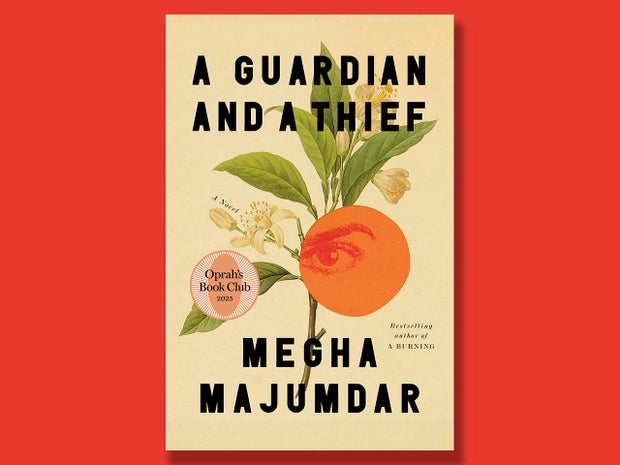 Knopf
Knopf
We may receive an affiliate commission from anything you buy from this article.
A National Book Award finalist, Megha Majumdar's "A Guardian and a Thief" (Knopf) is set in India in a climate-ravaged near-future, in which mother preparing to move her family to America awakens to discover that a starving young man has stolen all their passports — plunging her into seven days of desperation and moral reckoning.
Read an excerpt below.
"A Guardian and a Thief" by Megha Majumdar
Prefer to listen? Audible has a 30-day free trial available right now.
From the storeroom hidden under the stairs, Ma fetched a cup of rice and a sack of eggs speckled gray like the moon, then cooked, standing before the stove's blue fire, her eye upon the window and its dusk, in which bats swooped and the neem tree shivered and a figure down on the road pedaled a bicycle, whistling, as if everything was all right.
Thief, thought Ma. Who else but a person who had chanced upon fresh vegetables or fruit would wander the city of Kolkata in this ruined year, the heat a hand clamped upon the mouth, the sun a pistol against one's head, and recall a song? She watched to see what the thief would do. He pedaled past. But Ma saw a different reality shimmer into being, in which he leaned his bicycle against the wall, climbed the pipes like a toddy tapper, and appeared at her window. In that picture, the thief was a collector of local information, dutiful in his neighborhood eavesdropping, shrewd in following what he heard about the bins of onions and carrots, the sacks of lentils and rice, the bags of raisins and cashews hidden in the dark fist of the house, stolen by Ma from donations made to the shelter where she worked, while the city outside wept for a handful of something to eat.
There was — in the label accepted by the region — a shortage.
In the year prior to this day, farmers across the region had fallen, their bodies running fevers in air that no longer cooled. In the croplands, among stilled machines, pests had traveled from acre to new acre, savage in their feeding of grains. In the west a drought had cleaved riverbeds and in the east salt water had tainted the paddy fields. In the city, those who walked to the neighborhood markets with umbrellas in their hands and wishful lists in their pockets, broad corners torn from the newspaper with writing in Bengali — cabbage, ginger, lychees if they were good, ice cream, half loaf of bread — found the roads alongside which the markets usually sat, its baskets and tarps invading, rickshaws and cars sounding their horns, slow shoppers inspecting the purple shine of eggplant and pressing guavas hard as hail, instead completely empty, nothing but some onion peel scattered at the edges where the pavement gave way to earth, where on most days goats and cows might have nudged the soil for something to eat. But those animals were gone too.
It had happened before. 1770, when crops failed and smallpox plagued the enfeebled. 1876, when drought struck the Deccan Plateau and the British continued to export what grain remained. 1943. Those black-and-white newspaper photos, in which people appeared as sunken eyes and twig-thin limbs, facing a photographer who could do nothing for them, their fullness — their love, their humor, their annoyance, their preference — pared by the lens to reveal what remained, which was hunger.
Excerpted from "A Guardian and a Thief" by Megha Majumdar. Copyright © 2025 by Megha Majumdar. All rights reserved. No part of this excerpt may be reproduced or reprinted without permission in writing from the publisher.
Get the book here:
"A Guardian and a Thief" by Megha Majumdar
Buy locally from Bookshop.org
For more info:
- "A Guardian and a Thief" by Megha Majumdar (Knopf), in Hardcover, Large Print Trade Paperback, eBook and Audio formats
- meghamajumdar.com


















































